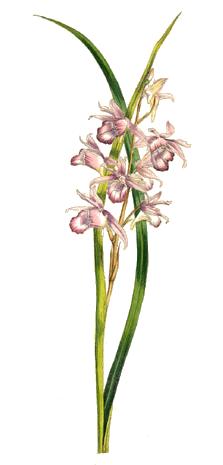Biology:Phaius
| Swamp orchids | |
|---|---|

| |
| Phaius rosellus 1847 illustration | |
| Scientific classification | |
| Kingdom: | Plantae |
| Clade: | Tracheophytes |
| Clade: | Angiosperms |
| Clade: | Monocots |
| Order: | Asparagales |
| Family: | Orchidaceae |
| Subfamily: | Epidendroideae |
| Tribe: | Collabieae |
| Genus: | Phaius Lour.[1] |
| Synonyms[1] | |
| |
Phaius, commonly known as swamp orchids[2] or in Chinese as 鶴頂蘭屬/鹤顶兰属 (he ding lan shu),[3] is a genus of forty-five species of flowering plants in the orchid family, Orchidaceae. They are evergreen, terrestrial herbs which form clumps with crowded, sometimes stem-like pseudobulbs, large, pleated leaves and relatively large, often colourful flowers. Species in this genus are found in the tropical parts of Africa, Asia, Southeast Asia, New Guinea, Australia , and various islands of the Pacific and Indian Oceans.[1] One species is also naturalized in Hawaii, Florida, and the Caribbean.[4]
Description
Orchids in the genus Phaius are evergreen, terrestrial, sympodial herbs with thin underground rhizomes and crowded above ground, sometimes stem-like pseudobulbs. There are several pleated, stalked leaves emerging from the pseudobulb. The flower stalk is unbranched and bears a few to many moderately large, resupinate, often colourful flowers. The sepals and petals are similar in size and shape and the labellum has three lobes and a shallow pouch near its base.[2][3][5][6][7]
Taxonomy and naming
The genus Phaius was first formally described in 1790 by João de Loureiro and the description was published in his book Flora Cochinchinensis.[8][9] The specific epithet (Phaius) is derived from the Ancient Greek word phaios meaning "dusky" or "brown",[10] referring to the brownish colour of the flowers of many species in this genus.[5]
List of species
The following is a list of Phaius species recognised by Plants of the World Online as of September 2023:[11]
- Phaius amboinensis Blume (1856)
- Phaius baconii J.J.Wood & Shim (1994)
- Phaius borneensis J.J.Sm. (1903)
- Phaius callosus (Blume) Lindl. (1831)
- Phaius columnaris C.Z.Tang & S.J.Chen (1985)
- Phaius cooperi Rolfe (1858)
- Phaius corymbioides Schltr. (1911)
- Phaius daenikeri Kraenzl. (1929)
- Phaius ecalcaratus J.J.Sm., (1911)
- Phaius flavus (Blume) Lindl., (1831)
- Phaius grandiflorus (Nadeaud) Govaerts (2011)
- Phaius gratus Blume (1856)
- Phaius hainanensis C.Z.Tang & S.J.Chen (1982)
- Phaius hekouensis Tsukaya, M.Nakaj. & S.K.Wu (2010)
- Phaius indigofer Hassk. (1842)
- Phaius indochinensis Seidenf. & Ormerod (1995)
- Phaius labiatus J.J.Sm. (1920)
- Phaius landyae P.J.Cribb & J.V.Stone (2017)
- Phaius leonidii P.J.Cribb & J.V.Stone (2017)
- Phaius longicornu Guillaumin (1957)
- Phaius luridus Thwaites (1861)
- Phaius lyonii Ames (1915)
- Phaius mannii Rchb.f. (1881)
- Phaius mishmensis (Lindl. & Paxton) Rchb.f. (1857)
- Phaius montanus Schltr. (1912)
- Phaius nanus Hook.f. (1890)
- Phaius occidentalis Schltr. (1903)
- Phaius pauciflorus (Blume) Blume (1856)
- Phaius pauciflorus var. pallidus (Ridl.) Holttum (1947)
- Phaius pauciflorus subsp. pauciflorus
- Phaius pauciflorus var. punctatus (Lindl.) J.J.Sm. (1920)
- Phaius pauciflorus subsp. sabahensis J.J.Wood & A.L.Lamb (1993)
- Phaius pauciflorus var. sumatranus J.J.Sm. (1920)
- Phaius philippinensis N.E.Br. (1889)
- Phaius pictus T.E.Hunt (1952) (accepted by Council of Heads of Australasian Herbaria)[12]
- Phaius pulchellus Kraenzl. (1882)
- Phaius pulchellus var. ambrensis Bosser (1971)
- Phaius pulchellus var. andrambovatensis Bosser (1971)
- Phaius pulchellus var. pulchellus
- Phaius pulchellus var. sandrangatensis Bosser (1971)
- Phaius reflexipetalus J.J.Wood & Shim (1994)
- Phaius robertsii F.Muell. (1883)
- Phaius stenocentron Schltr. (1911)
- Phaius subtrilobus Ames & C.Schweinf. (1920)
- Phaius takeoi (Hayata) H.J.Su (1989)
- Phaius tankervilleae (Banks ex L'Hér.) Blume (1856)
- Phaius tankervilleae var. antoninae (P.Balzer) J.V.Stone & P.J.Cribb (2017)
- Phaius tankervilleae var. australis (F.Muell.) J.V.Stone & P.J.Cribb (2017)
- Phaius tankervilleae var. baolocensis (Duy, Tao Chen & D.X.Zhang) J.V.Stone & P.J.Cribb (2017)
- Phaius tankervilleae var. bernaysii (F.Muell. ex Rchb.f.) J.V.Stone & P.J.Cribb (2017)
- Phaius tankervilleae var. devogelii J.V.Stone & P.J.Cribb (2017)
- Phaius tankervilleae var. tankervilleae
- Phaius tenuis Rchb.f. (1857)
- Phaius tetragonus (Thouars) Rchb.f. (1855)
- Phaius tonkinensis (Aver.) Leonid Vladimirovich Averyanov (ru) (2005)
- Phaius trichoneurus Schltr. (1925)
- Phaius wallichii Lindl. (1831)
- Phaius wenshanensis F.Y.Liu (1991)
Distribution
Orchids in the genus Phaius are found in tropical Africa, India , tropical and subtropical China , Malaysia, the Philippines , Indonesia, New Guinea, New Caledonia, Polynesia and Australia. Nine species, four of which are endemic, occur in China and three species including two endemics are found in Australia . The Australian species are found in Queensland, the Northern Territory and New South Wales.[3][5]
References
- ↑ 1.0 1.1 1.2 "Phaius". World Checklist of Selected Plant Families (WCSP). Royal Botanic Gardens, Kew. http://wcsp.science.kew.org/namedetail.do?name_id=150964.
- ↑ 2.0 2.1 Jones, David L. (2006). A complete guide to native orchids of Australia including the island territories. Frenchs Forest, N.S.W.: New Holland. p. 361. ISBN 1877069124.
- ↑ 3.0 3.1 3.2 Chen, Xinqi; Cribb, Phillip J.; Bell, Alexandra. "Phaius". Flora of China. http://www.efloras.org/florataxon.aspx?flora_id=2&taxon_id=124866. Retrieved 27 October 2018.
- ↑ Biota of North America Program, county distribution map
- ↑ 5.0 5.1 5.2 "Phaius". Centre for Australian National Biodiversity Research (CANBR), Australian Government. 2010. http://www.canbr.gov.au/cpbr/cd-keys/RFKOrchids/key/rfkorchids/Media/Html/genera/Phaius.htm.
- ↑ Weston, Peter H.. "Phaius". Royal Botanic Garden Sydney. http://plantnet.rbgsyd.nsw.gov.au/cgi-bin/NSWfl.pl?page=nswfl&showsyn=&dist=&constat=&lvl=gn&name=Phaius. Retrieved 29 October 2018.
- ↑ "Genus Phaius". Orchids of New Guinea. http://www.orchidsnewguinea.com/orchid-information/genus/genuscode/39. Retrieved 29 October 2018.
- ↑ "Phaius". APNI. https://id.biodiversity.org.au/instance/apni/472611. Retrieved 29 October 2018.
- ↑ de Loureiro, João (1790). Flora Cochinchinensis. 2. Lisbon. p. 517. https://www.biodiversitylibrary.org/item/192157#page/169/mode/1up. Retrieved 29 October 2018.
- ↑ Brown, Roland Wilbur (1956). The Composition of Scientific Words. Washington, D.C.: Smithsonian Institution Press. p. 168.
- ↑ "Phaius". Plants of the World Online. https://powo.science.kew.org/taxon/urn:lsid:ipni.org:names:325891-2#children.
- ↑ "Phaius pictus". Australian Plant Name Index (APNI), IBIS database. Centre for Plant Biodiversity Research, Australian Government. https://biodiversity.org.au/nsl/services/rest/name/apni/66005.
External links
Wikidata ☰ Q2719951 entry
 |

